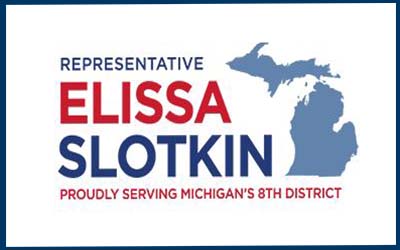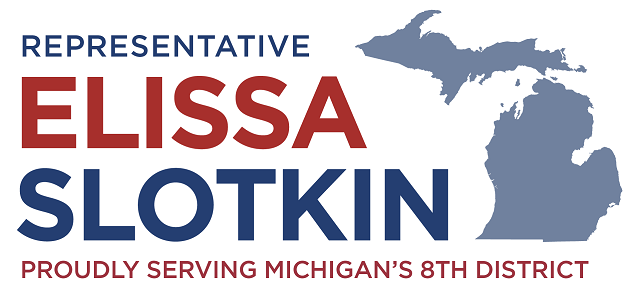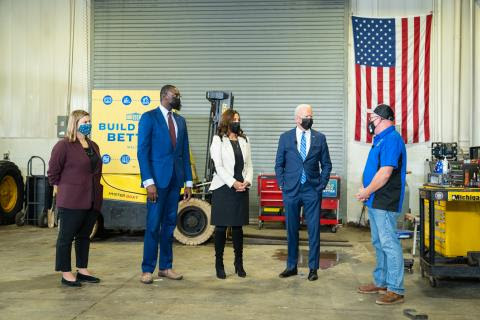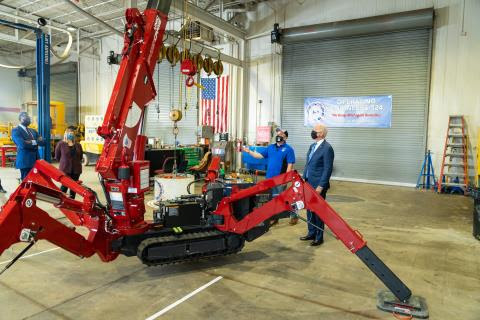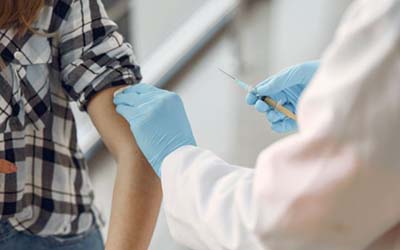
Governor Whitmer Announces $6.35 Million Investment to Reduce Court Backlog, Celebrates Opening of Michigan State Police Grand Rapids Facility
Investment would tackle court backlog of firearm-related cases, part of larger $75 million MI Safe Communities framework to protect public safety and reduce crime
GRAND RAPIDS, Mich. — Today, at the opening of the Michigan State Police Grand Rapids Facility, Governor Gretchen Whitmer proposed a $6.35 million investment to get illegal guns off the streets and enhance public safety. The proposal is part of the larger $75 million MI Safe Communities framework the governor laid out in July, which would utilize federal funding from the American Rescue Plan to reduce crime and keep people safe by tackling the court backlog, expanding resources available to law enforcement, and uplifting communities by making investments in jobs, justice, and education.
“We have to work together to reduce crime and get illegal guns off the street because every Michigander, no matter where they live or who they are, deserves to live safely,” said Governor Whitmer. “As a former prosecutor, keeping families safe is a top priority. Both the MI Safe Communities framework and the new Michigan State Police Grand Rapids Facility will put Michiganders first by helping law enforcement officers do their jobs more effectively and tackle the court backlog to get illegal guns off our streets. I will work with anyone to bring down crime and help Michiganders feel safe in their community. Together, we can build a safer, more just Michigan where every family can thrive, where every kid can get a great education, and where every person has a path to a good-paying, high-skill job.”
“Local courts have been dramatically impacted by the pandemic and will continue to struggle to clear their backlog without some assistance from the state,” said Attorney General Dana Nessel. “Delayed court dates means delayed justice, and that is unacceptable. I’ve long advocated for targeted investments to strengthen public safety and fully support more money to address the backlog and threat of illegal guns in our communities.”
“Courts pivoted quickly to remote proceedings to keep our justice system running, and trial courts statewide have held nearly four million hours of remote hearings since April of 2020,” said Michigan Supreme Court Chief Justice Bridget M. McCormack. “To protect the rights of defendants, however, many criminal proceedings must be in person, creating a substantial backlog in many courts. Additional visiting judges will help tackle that backlog, resolve cases more quickly, and help keep our communities safe.”
“Senseless criminal gun violence has no place in our Michigan communities,” said DJ Hilson, Muskegon County Prosecutor. “This investment in public safety will give prosecutors the ability to continue to work towards ensuring that our neighborhoods will have safe days and quiet nights.”
“Forensic laboratory services are critical to seeking justice in many criminal cases. The new, modern lab facility opening in Grand Rapids will provide police, prosecutors and the defense with the information necessary to process criminal cases more efficiently,” said Doug Lloyd, President of the Prosecuting Attorneys Association of Michigan. “PAAM also appreciates the efforts of the Governor and the legislature to provide critical funding to address the growing backlog of criminal cases brought about by the pandemic.”
MSP Grand Rapids Facility
The new Michigan State Police Grand Rapids Facility brings together three MSP facilities—the Grand Rapids Post, the Grand Rapids Forensic Science Laboratory, and the Sixth District Headquarters—under one roof to increase collaboration and drive down costs. The new facility is the result of close collaboration between the MSP and the Department of Technology, Management, and Budget (DTMB).
“A building is a building, and it doesn’t make the department or the service we provide, it’s our members who make those important contributions,” said Colonel Gasper. “But I must say that it’s really something special when the building matches the high caliber of professionalism our members display.”
The $6.35 million investment Governor Whitmer laid out today to tackle the court backlog and get illegal guns off the street was the result of hundreds of conversations the governor and her team had with law enforcement officers, community leaders, faith leaders, and families over several months. Based on those conversations, the governor announced the three-pillar, $75 million MI Safe Communities framework in July.
MI Safe Communities would:
- Invest more money into Michigan’s police departments to strengthen training policies and programs and foster collaboration between the Michigan State Police and local departments on specialty services.
- Increase the number of visiting judges with funding for prosecution and defense to tackle the backlog of criminal cases that has piled up during the pandemic, to protect the rights of defendants to appear in person, and help the justice system operate more efficiently while maintaining public safety.
- Make comprehensive investments to expand opportunity through Michigan’s education, jobs, and justice system including Collaborative Community Violence Intervention Programs, counseling, peer support, mediation, and social services to hospital patients recovering from violent injuries and prevent further violence and injuries.
Governor Whitmer will make additional announcements on the two other pillars of the MI Safe Communities in the coming weeks.
Since taking office, the governor has signed budget bills delivering $1.4 billion to local governments to help them fund local police, fire departments, and emergency medical services. She has also delivered $40 million in COVID hazard pay for local officers and first-responders and over $10 million premium pay for MSP troopers. These dollars help ensure police are better equipped to fight crime today and have the resources to fight crime tomorrow.
Last week, the governor signed the Fiscal Year 2022 budget bill that delivers more resources to state police to help them hire more troopers and expand and improve training. The latest budget also invests in 911 system upgrades and delivers on the kitchen-table fundamental issues that make our communities stronger: putting 167,000 Michiganders on a tuition-free path to higher-education or skills training, expanding low or no-cost childcare to 105,000 kids, repairing or replacing 100 bridges while creating 2,500 jobs, and more.
Earlier this year, Governor Whitmer and legislature worked together to put Michigan students first and passed the largest significant education investment in state history, closing the funding gap between schools in Michigan and including a historic amount of resources for schools to hire more nurses, counselors, and social workers. Early investments in mental and social health help reduce crime in the long run.
|




